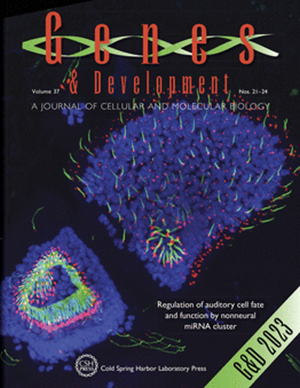Evidence for dual roles of histone H3 lysine 4 in antagonizing Polycomb group function and promoting target gene expression
IF 7.7
1区 生物学
Q1 CELL BIOLOGY
引用次数: 0
Abstract
Tight control over cell identity gene expression is necessary for proper adult form and function. The opposing activities of Polycomb and trithorax complexes determine the on/off state of cell identity genes such as the Hox factors. Polycomb group complexes repress target genes, whereas trithorax group complexes are required for their expression. Although trithorax and its orthologs function as methyltransferases specific to histone H3 lysine 4 (H3K4), there is no direct evidence that H3K4 regulates Polycomb group target genes in vivo. Using histone gene replacement in Drosophila, we provide evidence of two key roles for replication-dependent histone H3.2K4 in Polycomb target gene control. First, we found that H3.2K4 mutants mimic H3.2K4me3 in antagonizing methyltransferase activity of the PRC2 Polycomb group complex. Second, we found that H3.2K4 is also required for proper activation of Polycomb targets. We conclude that H3.2K4 directly regulates Polycomb target gene expression.组蛋白 H3 赖氨酸 4 在拮抗多聚酶群功能和促进目标基因表达方面发挥双重作用的证据
对细胞特征基因表达的严格控制是正常成体形态和功能的必要条件。多聚酶群和三叉轴复合体的对立活动决定了细胞特征基因(如 Hox 因子)的开/关状态。多聚酶群复合体抑制目标基因,而三叉轴复合体则是目标基因表达所必需的。虽然三叉轴及其直向同源物具有组蛋白 H3 赖氨酸 4(H3K4)特异性甲基转移酶的功能,但没有直接证据表明 H3K4 在体内调节多角体群靶基因。利用果蝇的组蛋白基因置换,我们提供了复制依赖性组蛋白H3.2K4在Polycomb靶基因调控中两个关键作用的证据。首先,我们发现H3.2K4突变体能模拟H3.2K4me3拮抗PRC2多角体群复合物的甲基转移酶活性。其次,我们还发现,H3.2K4 也是正确激活多角体靶标的必要条件。我们的结论是,H3.2K4 直接调控多角体靶基因的表达。
本文章由计算机程序翻译,如有差异,请以英文原文为准。
求助全文
约1分钟内获得全文
求助全文
来源期刊

Genes & development
生物-发育生物学
CiteScore
17.50
自引率
1.90%
发文量
71
审稿时长
3-6 weeks
期刊介绍:
Genes & Development is a research journal published in association with The Genetics Society. It publishes high-quality research papers in the areas of molecular biology, molecular genetics, and related fields. The journal features various research formats including Research papers, short Research Communications, and Resource/Methodology papers.
Genes & Development has gained recognition and is considered as one of the Top Five Research Journals in the field of Molecular Biology and Genetics. It has an impressive Impact Factor of 12.89. The journal is ranked #2 among Developmental Biology research journals, #5 in Genetics and Heredity, and is among the Top 20 in Cell Biology (according to ISI Journal Citation Reports®, 2021).
 求助内容:
求助内容: 应助结果提醒方式:
应助结果提醒方式:


